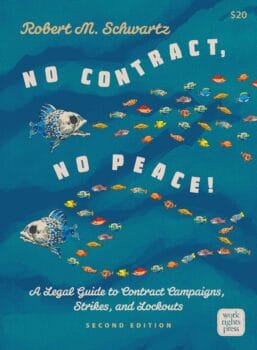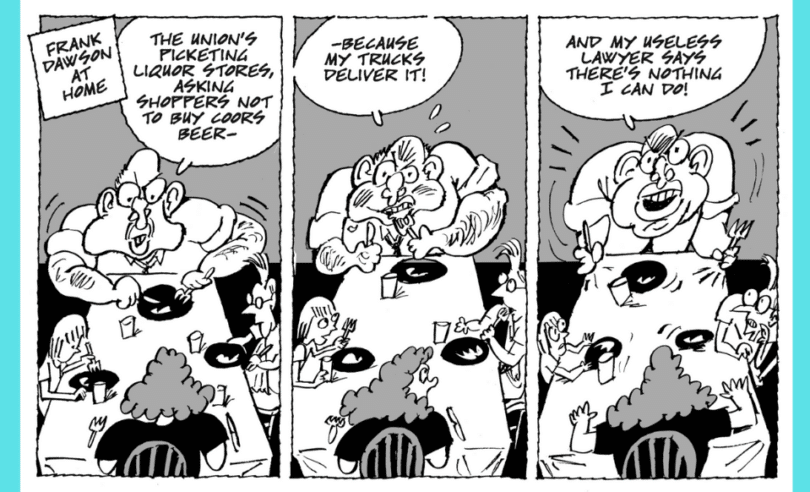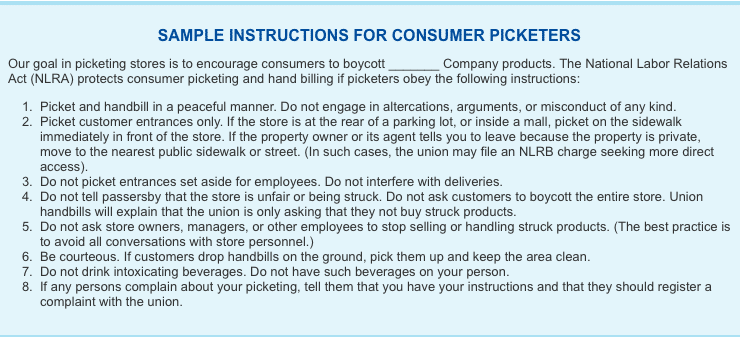Picketing stores that sell an employer’s products can publicize a strike and hurt earnings. It is also a good way to generate community support. Although the National Labor Relations Act (NLRA) usually bars unions from picketing secondary (i.e., “neutral”) employers, a narrow legal exception applies to retail stores and distributors—provided the union does not interfere with operations, only asks the public not to buy struck products, does not ask customers to stop doing all business with the retailer (unless the store only sells struck products), and does not demand that the store stop buying products from the struck employer.
Note: Consumer picketing can be directed against all products that a struck employer manufactures, processes, distributes, transports, or otherwise enhances in value.
Guidelines

Don’t let your boss be the only one that’s informed on your rights as a union member to organize a strike, picket, or action. Robert Schwartz’s ‘No Contract, No Peace! A Legal Guide to Contract Campaigns, Strikes, and Lockouts‘ provides valuable guidance on working without a contract, mobilizing members, ambulatory picketing, and more.
A union that conducts consumer picketing should heed the following guidelines to avoid NLRB charges that it is trying to coerce a store or distributor:
Identify the struck employer and its products. Picket signs and handbills should clearly name the struck employer and the targeted products and explain what action the union wants customers to take. “Budweiser workers on strike—Boycott Bud” conveys the necessary information. “Boycott scab beer” does not. On the bottom the union should add: “This is not a strike or boycott against this store and we are not asking employees to stop work.”
Do not ask store employees to stop working. Picketers should not ask store employees to stop handling struck products or to go on strike against the store. Picketing should be confined to hours when the store is open for business and should not take place in front of entrances reserved exclusively for employees.
Do not picket if struck products are the predominant or only items being sold. Consumer picketing is unlawful if struck goods provide all or the bulk of a seller’s income. For example, a union on strike against Ford Motor Company cannot conduct consumer picketing at an independently owned Ford dealership. Nor may the union ask shoppers to boycott an item that is so merged with other products—for example, plastic bags in a grocery store—that compliance would put the seller out of business.
Note: While a union cannot picket in the above circumstances, it can distribute handbills and display stationary banners attacking the retailer. Moreover, since it is not picketing, it can urge customers to boycott the entire store.
Shopping centers
When a store is located in a shopping center, it may be difficult to get close enough to display signs and distribute flyers. As a general rule, a shopping center can bar a union from picketing or handing out leaflets on its property.
An exception arises if the shopping center regularly allows other organizations—for example, the Salvation Army or the Little League—to set up tables or give out literature. In such circumstances, a union may be able to force access by filing an NLRB charge against the shopping center.
Questions and answers
Newspaper strike
Q. We are on strike against a newspaper. Can we picket local stores to ask the public not to buy products advertised in the paper?
A. Yes. The advertised items are struck products because the newspaper enhances their value. Signs and handbills should identify the specific items being advertised.
Pepsi’s the one
Q. Our company makes aluminum cans for Pepsi-Cola. Can we picket stores that sell Pepsi?
A. Yes, if your signs and handbills only ask customers to avoid Pepsi in cans.
Fishing concern
Q. We are striking a company that sells fish to local restaurants. Can we picket these establishments?
A. Yes, as long as you only ask customers not to buy struck products and do not ask them to eat elsewhere.
Threat to picket
Q. We are on strike against a meatpacking company. Can we tell grocery store managers that we will picket their stores if they continue selling company products?
A. Yes, but you must make clear that you will only be asking customers to boycott the struck products.
State law
Q. A law in our state forbids picketing at workplaces where no strike is in progress. Does this prevent consumer picketing?
A. No. The NLRA supersedes conflicting state laws.
Robert M. Schwartz is a retired labor lawyer. This article is drawn from his book No Contract, No Peace! A Legal Guide to Contract Campaigns, Strikes, and Lockouts.


